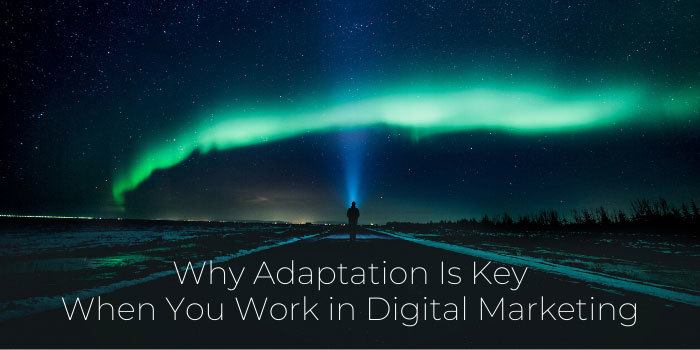Adaption is key in digital marketing - what the heck are you talking about? You may ask. In other words, keep changing your strategies as the trends change. We all talk about it, don't we? And it seems like common sense, doesn't it?
Yet, changes are complex. They're frightening concepts in the field on online marketing, but they’re also exciting ones.
In many ways, adaptations are the reason people like yourself can find success. You use your expertise to take websites and businesses off the ground to new heights, right? Anyone who puts in the work can create an excellent start for themselves by finding the new trend or new effective method to grow a site or finding a more effective implementation method for an existing one.
And just because you might be established or becoming more established now, you can’t ignore the need to keep up with innovations today. Here are a few of the main reasons that you should regularly consider how and why online marketing is changing:

The Internet Regularly Reinvents Itself
Even ten years ago, Google wasn’t the absolute dominating force it is today, and its search algorithms between then and now have advanced to the point of near unrecognizability. Smartphones were only common after 2010.
Social media is rapidly developing itself even today and with events in big data and political turmoil in the United States surrounding the subject, it can be difficult to say where it might go even in the next few years.
It’s important to bring up these points because they show that the internet hardly stays the same for even a decade. And while it can be difficult to predict what might happen, you don’t have to be left behind. Partially reinventing your work alongside changes will find you being able to impress and retain clients more easily or finding more success with your own site.
New People Are Constantly Entering the Field
Just as you first started online marketing however many months or years ago, new people are coming into the field, and they’re willing to try new ideas or the latest online marketing trend that works.
While your experience and reputation in the field will last for a while in terms of acquiring new clients, superior results from competitors will eventually sway potential employers away from you, and it will be hard to get back to a place of relative stability even if you were to start trying to adapt then.
Even If Your Clients or Audience Doesn’t Change, Their Methods Will
You might be blessed with working with the same clients for years on end, and that’s amazing if it’s the case. Yet even if you can expect to work with the same clients for the foreseeable future, that doesn’t mean that you won’t be seeing changes on their end in terms of how they want their marketing done.

As the online environment changes, they’ll want to improve their results based on their findings, as any successful client of yours will constantly be looking for methods to increase their reach and convert more leads. Ideally, you should be able to stay on top of this before they do, or at least have an understanding of what they might ask for. That will make you look more of an expert in their eyes and you can remain confident in your business.
If you work on your own websites, you should already know that often your audience won’t grow if you use the same marketing techniques and copy every year. If this is your situation, we hope that this article serves as a reminder to constantly innovate and check to see what can expand your reach.
Why Adaptation Is Key When You Work in Digital Marketing
Adaptation is key when you work in digital marketing because the industry is constantly evolving. Technology, consumer behavior, and trends are changing at a rapid pace, and digital marketers need to keep up with these changes to remain effective. Here are some reasons why adaptation is crucial in digital marketing:
Technology is always advancing:
New tools, platforms, and software are being introduced every day, and digital marketers need to stay up-to-date with these advancements to create innovative campaigns and strategies. Technology is always advancing, and adaptation is key when you work in digital marketing. Digital marketing relies heavily on technology to reach and engage with consumers, and the field is constantly evolving as new tools and platforms are introduced.
Digital marketers need to stay up-to-date with the latest technology trends and innovations to remain competitive and effective. This may include learning new software, understanding new social media platforms, or keeping up with changes to search engine algorithms.
By adapting to new technologies and incorporating them into their digital marketing strategies, marketers can create more impactful campaigns and stay ahead of the curve.
Consumer behavior is constantly changing:
Consumer behavior is constantly changing due to a variety of factors such as technological advancements, changes in social norms, economic factors, and evolving preferences. Here are some examples of how consumer behavior is changing:
- Mobile usage: With the widespread adoption of smartphones and tablets, consumers are increasingly using mobile devices to browse the internet, make purchases, and interact with brands.
- Social media: Social media has transformed the way consumers interact with brands, and many consumers now use social media to research products and services, seek recommendations, and engage with companies.
- E-commerce: Online shopping has become increasingly popular, and consumers are now more comfortable making purchases online than ever before.
- Sustainability: Consumers are becoming more conscious of the environmental impact of their purchases and are increasingly seeking out sustainable products and brands.
- Personalization: With the abundance of data available, consumers now expect personalized experiences from the brands they interact with, from tailored product recommendations to personalized marketing messages.
These are just a few examples of how consumer behavior is changing, and digital marketers need to adapt to these changes to stay relevant and effectively engage with their target audiences. By understanding these evolving consumer behaviors, digital marketers can create strategies that resonate with their audiences and drive results.
Competition is increasing:

With more businesses moving online, the digital marketing space is becoming more crowded.
- More businesses are adopting digital marketing: As traditional brick-and-mortar businesses move online, the competition in the digital space is becoming more intense. This means that businesses need to be more strategic and creative in their digital marketing efforts to stand out from the competition.
- The rise of e-commerce: With the growing popularity of e-commerce, businesses that previously relied on physical storefronts are now entering the online marketplace, increasing competition in the digital space.
- Social media advertising: Social media advertising has become increasingly popular, and as more businesses invest in social media advertising, the competition for ad space and audience attention is increasing.
- Search engine optimization (SEO): SEO is an important aspect of digital marketing, and as more businesses focus on improving their search engine rankings, competition for the top spots on search engine results pages is becoming more intense.
- Emerging technologies: New technologies such as virtual reality and artificial intelligence are transforming the digital marketing landscape, and as more businesses adopt these technologies, the competition to create innovative campaigns and strategies is increasing.
- To stand out, digital marketers need to be creative and adaptable to stay ahead of the competition.Analytics and metrics are constantly evolving:
The data used to measure the effectiveness of digital marketing campaigns is constantly changing, and marketers need to adapt to new metrics and analytics tools to accurately track and measure their results.
The Perils of Neglecting Adaptation in Digital Marketing
Failure to Meet Customer Expectations
- The fast pace of the digital world means customer expectations are constantly changing.
- When a business does not adapt its digital marketing strategies, it falls behind in meeting these expectations.
- Competitors who are more adaptable seize the opportunity to fulfill customer desires, gaining a loyal following.
Losing Relevance
- Digital platforms and trends evolve continually.
- A brand may lose its relevance if it doesn’t keep up with these changes.
- Outdated marketing tactics can come across as disconnected from the modern consumer.
Decreased Visibility

- Search engine algorithms change frequently.
- Failing to adapt to these changes results in decreased visibility for a business.
- Lower visibility means fewer people get to see what a business offers, affecting the bottom line negatively.
Reduced Engagement
- Consumers are drawn to fresh, relevant content.
- Stale, repetitive digital marketing bores consumers, reducing engagement levels.
- Reduced engagement means fewer shares, likes, and interactions, which in turn leads to a decline in organic reach and potential customer conversions.
Inefficient Resource Utilization
- Resources may be wasted on outdated or ineffective digital marketing strategies.
- Without adaptation, a company may continue to invest in tactics that no longer yield good returns.
Missed Opportunities
- New platforms and technologies often present new marketing opportunities.
- Failure to adapt means missed chances to reach new or potential customers on emerging platforms or through novel methods.
Damaged Reputation
- A brand that appears outdated or out of touch risks damaging its reputation.
- Modern consumers often expect brands to be socially and technologically savvy.
Unfavorable Customer Perception
- Keeping up with the latest digital marketing trends is also a way to show that a business is forward-thinking and customer-centric.
- When a business fails to adapt, it may be perceived as stagnant or indifferent to customer needs.
Data Misinterpretation
- Digital marketing requires analyzing consumer data to make informed decisions.
- Without adaptation, old analytic methods may misinterpret current data leading to misinformed marketing strategies.
Financial Loss
- All these factors contribute to potential financial loss.
- Competitors who adapt quickly snatch a larger market share, gradually edging out businesses that do not evolve.
Adapting to the constantly changing digital landscape is not an option but a necessity for businesses aiming for sustained success. The failure to adapt in digital marketing can have severe repercussions, making it a risky oversight for any business venturing in the digital space.
Conclusion
We absolutely do not want to discourage you from your marketing dreams or make you panic and scramble to find some new avenue to work on. Instead, we encourage you to regularly keep your finger on the pulse of the industry, review your efforts to see what is and isn’t working, and see in what areas you feel comfortable making strides in.
We mainly wish to warn you away from a form of intellectual laziness that traps many experienced marketing professionals, and we’re certain that if you’re reading this, you’re already doing quite well.
